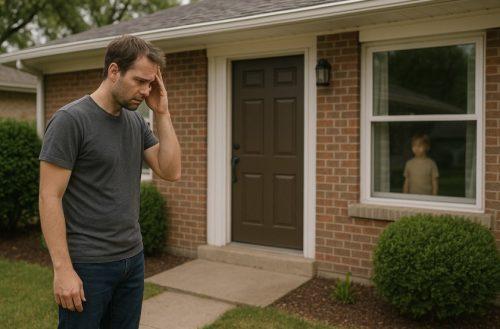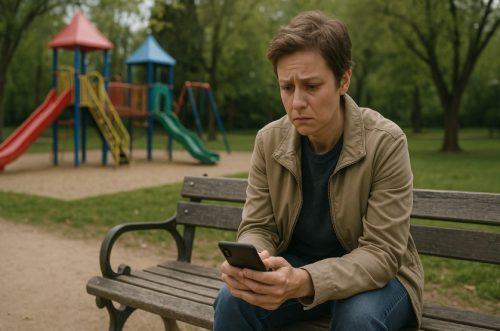Separation is never easy, but when your ex refuses to let you see your child, the emotional toll can be overwhelming. You may feel helpless, angry, or unsure of what steps to take next. It’s a situation no loving parent wants to face, the thought of missing out on precious moments with your child is deeply distressing.
Many parents ask, “Can I call the police if my ex won’t let me see my child?” It’s a valid question, and one that needs a legally sound and emotionally balanced answer. Understanding your rights under UK family law and knowing the correct legal path to take is essential.
In this guide, we’ll explore your options, clarify your legal standing, and help you navigate this difficult time with clarity and confidence.
Can My Ex Stop Me Seeing My Child?

When a relationship ends, it can be difficult to agree on parenting arrangements. But unless a court has issued an order, either parent may technically withhold contact, even though it may not be fair or in the child’s best interest. A parent can only legally stop contact if there is a valid court order backing their decision.
Without this, denying access may be considered unreasonable, although not necessarily illegal. UK family law prioritises the child’s well-being above all else, which typically includes maintaining a relationship with both parents unless it would cause harm.
Some key points include:
- No court order means no automatic legal right to deny contact.
- Child’s welfare is paramount in all legal decisions.
- If there are safeguarding concerns, the other parent may apply for a prohibited steps order.
In England and Wales, courts encourage co-parenting wherever possible. Unless there is proven risk, both parents should be involved in the child’s life. A parent cannot simply withhold visitation based on personal conflict, suspicion, or control. If they do, the matter becomes a civil dispute, which can be legally addressed.
In short, while your ex might temporarily block contact, they cannot lawfully maintain this without court backing. If communication breaks down and your access is unfairly blocked, legal action becomes necessary to restore balance and protect your parenting rights.
Can I Call the Police if My Ex Won’t Let Me See My Child?
You might instinctively think calling the police is the right action if your ex denies access. However, in most cases, the police will not intervene because child contact disputes are civil matters, not criminal offences.
Here’s what you need to know:
- Police typically do not enforce child contact unless a child is in danger.
- They may only act in cases involving violence, abduction, or harm.
- If a court order is in place but not followed, police may still not intervene unless there is a criminal breach.
Calling the police may make the situation worse, especially if your ex feels threatened or if your child is caught in the middle. It could inflame tensions and disrupt your ability to build a co-parenting relationship. Police can, however, perform a welfare check if you have serious concerns about your child’s safety.
That said, here are situations where calling the police might be appropriate:
- You suspect your child is in immediate physical or emotional danger.
- Your ex is behaving violently or has made threats.
- There’s a breach of the peace during a handover.
- Your child has been illegally removed or withheld during your custody period.
So while you can contact the police at any time, it’s important to understand that their powers are limited in family matters unless an urgent risk exists. Legal action through the family courts remains the proper course.
What Are My Legal Options If My Ex Denies Contact?

When informal conversations fail and your ex continues to prevent contact, you have several legal avenues to explore. Each step aims to prioritise your child’s welfare while protecting your right to parent.
Mediation Before Court (Legal Expectation)
In most cases, the court requires that you attempt mediation before issuing proceedings. This process helps resolve disputes in a neutral environment and often leads to quicker, less hostile resolutions.
Benefits of mediation include:
- Encourages open communication.
- Helps maintain amicable co-parenting.
- Cost-effective compared to the court.
- Agreements can be made into a Parenting Plan.
If your ex refuses mediation, you can still proceed to court by requesting a MIAM certificate (Mediation Information and Assessment Meeting).
Arbitration as an Alternative
Another option is family arbitration. This is similar to court but handled privately with a qualified arbitrator who can issue binding decisions.
Why arbitration may work?
- Faster than traditional court.
- Decisions are legally binding.
- More flexibility in choosing a specialist arbitrator.
It’s especially suitable if both parties are willing to cooperate but need a neutral third party to make the final decision.
Applying for a Child Arrangements Order
If mediation and arbitration fail, you can apply to the court for a Child Arrangements Order.
This formalises the contact agreement and lays out:
- Who the child lives with.
- When and how the child sees each parent.
- Specific times, locations, and even conditions for contact.
Here’s a quick comparison of legal options:
| Legal Option | Binding | Court Involvement | Speed | Cost |
| Mediation | No | No | Moderate | Low |
| Arbitration | Yes | Indirect (can be converted) | Fast | Moderate |
| Child Arrangements Order | Yes | Yes | Slow | Higher |
Court Enforcement if Order is Breached
If a Child Arrangements Order is ignored, you can apply for enforcement.
The court may impose:
- Additional parenting time.
- Financial penalties or cost orders.
- Mandatory parenting classes.
- In extreme cases, imprisonment for contempt of court.
This ensures that a parent cannot act unilaterally without consequences. Courts take breaches seriously, especially when it repeatedly harms the child’s relationship with a parent.
In all cases, it’s important to document your actions, including missed visits, attempts to communicate, and any threats or hostility. This builds a strong legal case should court involvement become necessary.
What Should I Do First if My Ex Blocks Access?

It’s easy to feel overwhelmed when your ex denies you contact, but staying calm and following a structured approach is key. The first steps you take can influence the outcome of the situation.
Start by trying to communicate directly. Explain calmly that your child benefits from seeing both parents. Emphasise your desire to put your child first and try to understand the reason behind the refusal. Avoid heated arguments or accusatory language.
If communication fails:
- Document everything: Save texts, emails, and notes from missed visits.
- Reach out to a family solicitor: They can assess the situation and suggest the best next steps.
- Attempt mediation: Even if you’re unsure it will work, courts usually require proof that you tried.
By acting constructively and respectfully, you reduce the chances of worsening the situation and increase your chances of resolving it peacefully. Think of this as a long game, building a consistent, child-focused approach will help you in any future legal action. Ultimately, the first response should aim to keep things civil while showing a willingness to resolve matters legally if necessary.
Is It Ever Right to Call the Police Over Child Contact?
It might seem like the fastest solution, but calling the police should only be considered under specific circumstances. Misusing this option can backfire and hurt your case in the long run.
Police may intervene if:
- The child is in imminent danger.
- There’s a threat of violence or abuse.
- A criminal offence has occurred (e.g. abduction).
Avoid calling the police simply because your ex is being unreasonable. Officers cannot enforce parenting agreements unless they relate to criminal conduct. Making frequent police calls can also be seen as using intimidation, which may reflect poorly in court.
Think carefully and ask yourself: “Would I regret not calling the police if something bad happened?” If the answer is yes, then make the call. Otherwise, legal channels are the safer and more effective route.
Can I Sue My Ex for Stopping Child Contact?

You might feel like suing is the right response, but in UK family law, the concept of “suing” doesn’t apply in this context. Instead, the correct legal route is to apply for a Child Arrangements Order or request enforcement of an existing one.
What you can do?
- Apply to the court to formalise access rights.
- Request a cost order if your ex acted unreasonably.
- Ask the court to adjust the arrangement based on persistent non-compliance.
If one parent shows a pattern of obstructing contact without a valid reason, the court may view this as contrary to the child’s best interests and act accordingly. In extreme cases, sanctions may include a warning, fines, or changes to custody. So while you cannot sue in the traditional sense, there are robust legal tools available to hold your ex accountable.
How Do Courts Decide on Child Contact in the UK?
Family courts are driven by one guiding principle the best interests of the child. Every decision considers the child’s safety, stability, and emotional needs.
Factors the court looks at include:
- The child’s emotional and physical welfare.
- The ability of each parent to meet the child’s needs.
- Wishes and feelings of the child, depending on age.
- Any history of abuse or neglect.
- The importance of maintaining family relationships.
The court may request reports from CAFCASS (Children and Family Court Advisory and Support Service) or order further investigations if there are allegations of harm. If needed, children can speak privately with a CAFCASS officer to express their views.
The result is usually a Child Arrangements Order detailing living arrangements and contact schedules. In high-conflict cases, a more structured order may be issued to ensure compliance and stability for the child.
Every case is unique, but courts remain focused on fostering relationships, not punishing parents. Legal intervention should be viewed as a way to create consistency and protect a child’s right to a loving relationship with both parents.
Conclusion
Facing denial of child contact is painful, but knowing your legal rights gives you the power to respond effectively. While your instinct might be to involve the police, it’s important to understand their limited role in civil matters. Legal channels such as mediation, arbitration, or a child arrangements order are usually the most appropriate path.
Each step you take should be in the best interests of your child — emotionally, legally, and practically. Keep records, remain calm, and don’t be afraid to seek legal advice. The family court system is designed to support the child’s right to have both parents in their life.
With the right guidance and persistence, you can regain access to your child and re-establish a meaningful relationship built on stability, care, and love.
FAQs
What if my ex stops contact without a court order?
If no court order exists, they technically can, but it’s not legally enforceable without valid concerns.
Can the police remove my child from my ex’s home?
Only in extreme situations involving criminal offences or danger to the child’s welfare.
Is mediation mandatory before going to court?
Yes, most cases require you to attempt mediation or get a MIAM certificate before proceeding.
What happens if my ex ignores a child arrangements order?
You can apply for enforcement, and the court may impose penalties or adjust contact terms.
Can I get extra time with my child if visits are missed?
Yes, the court may grant additional parenting time to make up for what was lost.
Do courts consider the child’s wishes?
Yes, especially if the child is mature enough to express informed preferences.
Can grandparents apply for contact too?
They can, but they usually need permission from the court before making an application.








